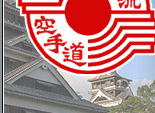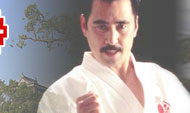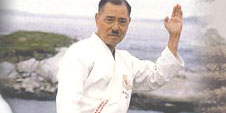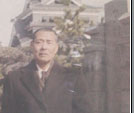The Chito-Ryu Showa
At the core of the Chito-Ryu philosophy is the Showa, a poem recited at the end of every classes by teacher and students as a reminder of how we must train and in turn live our lives in order to gain the maximum benefits that Chito-Ryu Karate-do has to offer. Being originally written in Japanese, it is impossible to accurately translate into English as many of the Japanese words do not have a direct translation. However, if you are serious about your study of Chito-Ryu it is essential to understand the concepts of the Showa.
Download Showa as MP3 file (346KB) [Right click to download].
唱和
我々千唐流空手道を修業する者は
常に武士道精神を忘れず
和と忍をもって成し
そして力必達
Showa
Ware ware chito-ryu karate-do o shugyo suru mono wa
Tsuneni bushido seishin o wasurezu
Wa to nin o motte nashi
Soshite tsutomereba kanarazu tassu
Showa
We who study Chito-Ryu karate-do
Must never forget the spirit of the samurai
With peace, perseverance and hard work
We are sure to reach our goals
Explaining the Showa
Things to consider in when contemplating the meaning of the Showa and it's translation into English.
"Karate-do" - The way of empty hand is concerned with developing correct manners, attitude, spirit and character, using the physical training as a the vehicle or the means. Karate (or karate-jutsu, or more recently sports karate) is merely concerned with developing the physical aspects alone.
"Shugyo" - Study . A very inadequate translation due to the complete lack of an English equivalent that represents the meaning behind this word. Read an essay on this topic.
"Bushido seishin" - The spirit of the samurai or the spirit of bushido must be considered in the context of the culture of Japan. The samurai lived by the code of bushido (the way of the warrior). If we are to take the showa literally, perhaps this refers to the seven virtues of the bushido:
- Gi 義 Justice
- Yuu 勇 Bravery
- Jin 仁 Benevolence
- Rei 礼 Politeness
- Makoto 誠 Veracity
- Meiyo 名誉 Honor
- Chuugi 忠義 Loyalty
Alternatively, bushido is often representative of the ways of traditional Japan that is now being swallowed up by the western influences.
"Wa to nin" - Peace (harmony) and perseverance (patience)
"Tsutomereba kanarazu tassu" - If we work hard, we are sure to reach our goals. Most native Japanese people would not read the characters of the final line of the showa in this way, instead, it would be read as "Rikihittatsu". Again this section is very difficult to accurately translate.
For further explanation of the Showa, please refer to the Chito-Ryu Sohonbu website. |



